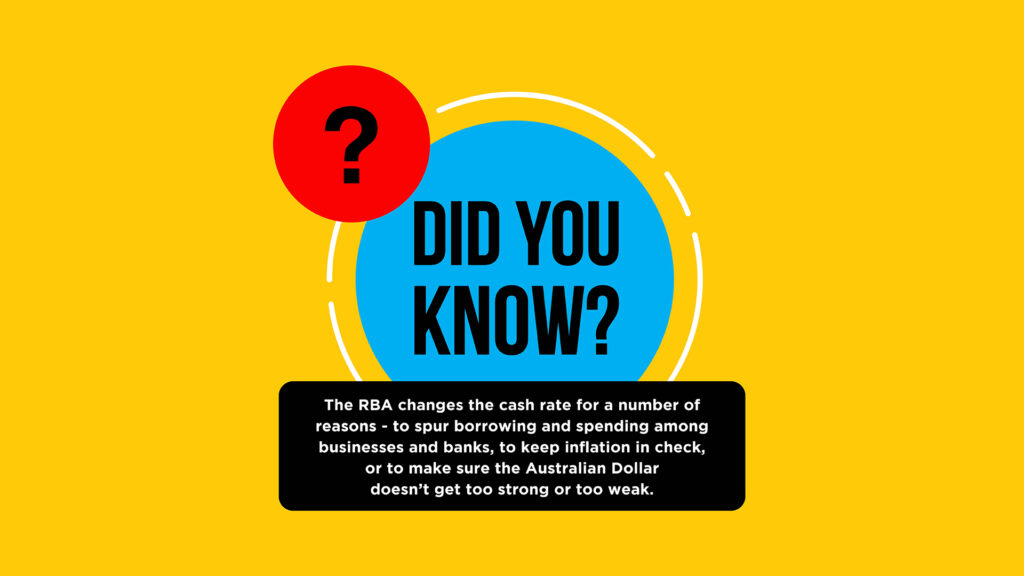While whispers of Australia’s property market cooling have been linked to the RBA and the current cash rate, what is it and how exactly is this calculated?
In a nutshell, interest rates are essentially market prices, which means they are a function of what can be broadly dubbed a case of supply and demand. There are both short term and long term factors that have driven interest rates lower on a global scale, all of which have in one way or another affected us here at home.
Although they are currently sitting close to record lows on a global scale, many homeowners right around the nation are understandably anxious about what the future holds for them in the event of any changes, and what ripple effects our country’s cash rate may potentially hold. In order to understand the role of Australia’s cash rate, one must first understand the part that the RBA has to play.
The Relationship Between The RBA And Cash Rate
A central bank, reserve bank, or monetary authority is an institution that manages the currency and monetary policy of a state or formal monetary union, and oversees their commercial banking system. In contrast to a commercial bank, a central bank possesses a monopoly on increasing the monetary base. In the Land Down Under, that institution is known as the RBA, or the Reserve Bank of Australia.
In essence, The Reserve Bank Board sets the target for the nation’s policy interest rate, otherwise known as the cash rate, in the Australian cash market – the market in which banks lend and borrow money from each other overnight. In extremely simplified terms, the cash rate is the interest that every bank has to pay on the money it borrows, or in its own words, the “overnight money market interest rate”. In turn, the RBA ensures that the cash rate remains consistent with the target the Board has set as part of the monetary policy decision. Changes in the cash rate flow through to other interest rates in the economy, influencing a wide range of economic activity and ultimately inflation.

It was the RBA that’s largely responsible for protecting Australia against many of the economic hits brought on by the pandemic, predominantly by lowering interest rates. As of November 2021, the Reserve Bank of Australia has left the cash rate at 0.1%, and has indicated a rate hike is still some time away.
The RBA changes the cash rate for a number of reasons – to spur borrowing and spending among businesses and banks, to keep inflation in check, or to make sure the Australian Dollar doesn’t get too strong or too weak. How monetary policy is implemented by the RBA can be explained by stepping through five aspects of the cash market: the price, quantity, demand, supply and the policy interest rate corridor.
The RBA governor Philip Lowe has indicated that until inflation and wage growth stabilises, a cash rate hike, and therefore interest rate increase, is unlikely to be seen before the end of 2023 – defying the expectations of financial markets and industry experts alike. If you’re concerned about interest rates and the outlook of Australia’s property market in both the immediate and distant future, it’s worth consulting with the professionals instead of nervously speculating.
Should you be looking to sell your home or purchase a new one, enlisting the services of a free property advisor like ESPA can often be a game changer, and help you to make informed and educated decisions when it comes to the prospect of selling in 2022. As an example, your advisor would likely research the property, local agents, check the zoning, evaluate market conditions, and communicate clearly with you regarding all of your options – but where do you find one?
Take The Stress Out Of Selling Property
As a completely free service, Emergency Services Property Advisors provide property advisor services to Police, Fire, Ambulance and S.E.S personnel and their families right across Victoria.
Luke and the team at ESPA are passionate about providing support to some of Australia’s most valued public servants. Along with key industry insights, ESPA also works with a broad range of service providers linked to the real estate industry such as conveyancers, trades, legal practitioners and mortgage brokers.
If you are an emergency services worker looking to potentially buy or sell property in the future, please get in touch with Emergency Services Property Advisors today to discuss how we can turn your real estate dreams into reality, or call Luke directly on 0414 757 705.


